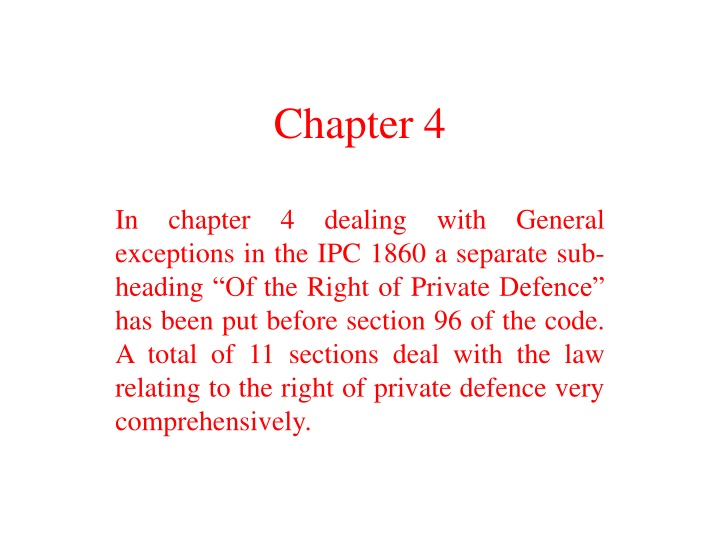
Right of Private Defence in IPC 1860 - Comprehensive Overview
Explore Chapter 4 of the Indian Penal Code 1860, which focuses on the right of private defence. It contains 11 sections detailing laws related to defending oneself and others against offences affecting the body or property. Section 96 specifically addresses actions done in private defence, absolving individuals from guilt when acting in self-defence. Section 97 elaborates on the right of private defence of the body and property, subject to certain restrictions outlined in Section 99. Additionally, Section 103 discusses when the right of private defence of property extends to causing harm to the wrongdoer.
Download Presentation

Please find below an Image/Link to download the presentation.
The content on the website is provided AS IS for your information and personal use only. It may not be sold, licensed, or shared on other websites without obtaining consent from the author. If you encounter any issues during the download, it is possible that the publisher has removed the file from their server.
You are allowed to download the files provided on this website for personal or commercial use, subject to the condition that they are used lawfully. All files are the property of their respective owners.
The content on the website is provided AS IS for your information and personal use only. It may not be sold, licensed, or shared on other websites without obtaining consent from the author.
E N D
Presentation Transcript
Chapter 4 In exceptions in the IPC 1860 a separate sub- heading Of the Right of Private Defence has been put before section 96 of the code. A total of 11 sections deal with the law relating to the right of private defence very comprehensively. chapter 4 dealing with General
Section 96 Things done in private defence Nothing is an offence which is done in the exercise of the right of private defence.
96 Section 96 merely gives a recognition to the fact that whenever something is done in the exercise of one s right of private defence, it would not amount to an offence. No state wants its citizens Consequently, every person has a right to resist when attacked. With the recognition of the right of private defence this section completely absolves a person from all guilt once the act is proved to be done in such defence. to be cowards.
Section 97 Right of private defence of the body and of property Every person has a right, subject to the restrictions contained in section 99, to defend (First) His own body, and the body of any other person, against any offence affecting the human body; (Secondly) The property, immovable, of himself or of any other person, against any act which is an offence falling under the definition of theft, robbery, mischief or criminal trespass, or which is an attempt to commit theft, robbery, mischief or criminal trespass. whether movable or
97 This section specifically provides that every person has a right to defend the person and property of his own and that of any other person. The right, however, is subject to certain restrictions or limitations as stated under section 99 IPC. The first part of sec 97 states that every person has a right to defend his own body and the body of any other person against any offence affecting the human body. The second part of this section states that every person has a right to defend the property, both movable and immovable, of any person including his own, against any act which is an offence falling under the definition of theft, robbery, mischief or criminal trespass or which is an attempt of any of these. The right of private defence of property is, therefore, comparatively restricted in the sense that it is available only in cases of the four offences mentioned above and their attempts.
Section 103 When the right of private defence of property extends to causing death The right of private defence of property extends, under the restrictions mentioned in section 99, to the voluntary causing of death or of any other harm to the wrong-doer, if the offence, the committing of which, or the attempting to commit which, occasions the exercise of the right, be an offence of any of the descriptions hereinafter enumerated, namely: (First) Robbery; (Secondly) House-breaking by night; (Thirdly) Mischief by fire committed on any building, tent or vessel, which building, tent or vessel is used as a human dwelling, or as a place for the custody of property; (Fourthly) Theft, mischief, or house-trespass, under such circum- stances as may reasonably cause apprehension that death or grievous hurt will be the consequence, if such right of private defence is not exercised.
103 This section relates exclusively to private defence of property only. In case of commission of the offence of robbery or its attempt the defence extends to cause even death of wrong doer. In case of house breaking by night, defined in section 446, or its attempt
Section 104 When such right extends to causing any harm other than death If the offence, the committing of which, or the attempting to commit which, occasions the exercise of the right of private defence, be theft, mischief, or criminal trespass, not of any of the descriptions enumerated in the last preceding section, that right does not extend to the voluntary causing of death, but does extend, subject to the restrictions mentioned in section 99, to the voluntary causing to the wrong-doer of any harm other than death.
104 Where the offence of theft, mischief or criminal trespass has been committed or attempted but the description are different from those enumerated in section 103 of the code, the right of private defence of property extends only up to the extent to voluntary causing of any other harm than death.
Section 105 Commencement and continuance of the right of private defence of property The right of private defence of property commences when a reasonable apprehension of danger to the property commences. The right of private defence of property against theft continues till the offender has effected his retreat with the property or either the assistance of the public authorities is obtained, or the property has been recovered. The right of private defence of property against robbery continues as long as the offender causes or attempts to cause to any person death or hurt or wrongful restraint or as long as the fear of instant death or of instant hurt or of instant personal restraint continues. The right of private defence of property against criminal trespass or mischief continues as long as the offender continues in the commission of criminal trespass or mischief. The right of private defence of property against house-breaking by night continues as long as the house-trespass which has been begun by such house- breaking continues.
Right to private defence of property 96 Things done in private defence 97 Right of private defence of the body and of property 103 When the right of private defence of property extends to causing death 104 When such right extends to causing any harm other than death 105 Commencement and continuance of the right of private defence of property
Imp. Case Yogendra Morarji v. StateAIR 1980 SC 660 Justice Sarkaria suggests that one should first try to see the possibility of a retreat than to defend by using force. Jaidev v. StateAIR 1963 SC 612 Justice Gajendra Gadkar said that in India there is no such rule which expects a person first to run away or at least try to do so before he can exercise his right of private defence. It seems that Jaidev s decision is the correct exposition of the law.






















